- Home
- Rebecca Lim
Tiger Daughter Page 6
Tiger Daughter Read online
Page 6
I think about all the ways that long division doesn’t make sense to me – how I can never tell which bit is the divisor or the dividend or the quotient, or what numbers to bring down, and where to put them exactly.
But I don’t want to completely enrage Henry – I just need to keep him engaged, even if it’s just in numbers. So I do my best to solve the four equations he’s set me, leaving just the one obvious thing wrong with each answer, groaning as the bell goes for period five. As expected, the whole exercise has taken forever, and I’ve had no lunch, no sun and no chats. Stomach rumbling, I search out Miss Spencer and hand her the empty envelope with the desperate scribble all over it.
She calls out, as I’m hurrying away, ‘But Wen, you forgot the—’
And I raise my hand, shouting, ‘I know!’ and her face breaks into a wide grin, as she works out what I’ve done, on purpose. Miss Spencer waves the wrinkled envelope back at me in farewell as I hurry to French class.
That afternoon, after Mum and I have dropped the bag full of clothes for Henry with a note tucked inside that says it’s from the Kuol, Salah, Deng and Abango families, together with the fresh batch of homework, we stop at Mrs Xenakis’s pharmacy at precisely 3.45 pm.
The old Chinese woman Mum helped the other day is standing inside by the counter, next to an equally old wrinkly-faced man with hollow cheeks dressed in a faded brown three-piece suit with widely spaced, thin stripes. Both elderly people are smiling, and the woman reaches out and catches one of Mum’s hands in hers and begins shaking it warmly.
Mum’s face breaks up into smiley lines as she chats to them in Shanghainese while Mrs Xenakis and I look on, grinning. Mum explained, when she got home from the hospital the other afternoon, that the old woman lived with her daughter’s family and was from Shanghai, and didn’t speak any other languages.
‘My third uncle’s wife was from Shanghai,’ Mum had told me with a faraway look. ‘I really loved that aunty, but she died just before I went to high school. We used to spend hours in the kitchen together when I was small because she cooked for the whole family. All of us lived in the one house, all the uncles and aunties and cousins, and because she was the best cook, she did all the cooking, for everyone.’
‘Didn’t she mind?’ I asked, my feelings about cooking being lukewarm at best.
Mum replied, ‘Everyone was expected to do what they were expected to do.’
‘No arguments,’ I’d added flatly.
‘These are different times,’ Mum had replied quietly. ‘Strange times. That time and this time are like two different countries separated by an insurmountable wall. Not everything from one makes sense in the other. I really miss that aunty. And her cooking.’
Mum turns to Mrs Xenakis now and says, ‘Mr and Mrs Wu agree that they must take better care of their health. What do you suggest they do, Mrs Xenakis? They trust your opinion very much.’
‘Well, now that winter is approaching,’ Mrs Xenakis replies immediately, ‘they should consider getting a flu shot each. I’ve had no way to ask them if they’ve had them done already. I can arrange that for them tomorrow, if they’d like – can you tell them that?’
Mum translates Mrs Xenakis’s words and the old couple smile and nod. When they say something to Mum in their language, I see something in Mum’s face change and she shakes her head quickly, replying in Shanghainese in a way that makes Mrs Wu’s face fall, and Mr Wu look worried.
Mrs Xenakis says, ‘What is it, Mrs Zhou? What’s the problem? Tell them it won’t cost them anything, if that’s what they’re worried about.’
Mum shakes her head, replying hastily, ‘It’s not the cost, Mrs Xenakis. It’s just that Mrs Wu wants me to be here tomorrow, so that I can translate when you give her and her husband the injection. But I can’t. It’s Tuesday.’
Mrs Xenakis looks confused. Mum glances at me, her eyes asking me to explain.
I say quickly, ‘It’s Dad’s one day off, every week. We always eat dinner together and there’s a lot of …’ Mum and I exchange looks again, ‘… preparation, a lot of work, involved. Mum and me are supposed to get back from school by four o’clock every day. No stops. But especially on Tuesdays.’
It sounds ridiculous when I say it out loud.
Mum glances at her watch now, as do I. It’s 3.54 pm. We need to get home, for the call.
Mrs Xenakis frowns, and her reply is swift. ‘Tell Mrs Wu we’ll do the flu shot on Wednesday, at three forty-five then.’ She looks from me to Mum, adding, ‘Is that all right? You’d be doing me another great favour, Mrs Zhou. I have a lot of elderly Chinese customers and it’s a real struggle to get across everything that I want to say …’
The uncertain look is back on Mum’s face – the look she wears when she’s faced with a Chinese restaurant menu with too many pages and Dad is waiting, impatiently, for a decision. At this point, Mum usually lets someone else decide for her.
So I do.
‘That’s fine,’ I cut in, before Mum can object, and she gives me a sharp, sideways glance but doesn’t disagree. ‘I’ll make sure she’s here at three forty-five on Wednesday, Mrs X.’
Mum translates for the Wus, and they nod, their faces relaxing, happy again.
‘See you on Wednesday,’ Mrs Xenakis says to the old couple, and to Mum, bowing low, from the waist, and I giggle.
‘We only do that on special occasions now, Mrs Xenakis. The bowing.’
‘This is a special occasion,’ Mrs Xenakis replies thoughtfully, as she straightens. ‘There’s a lot I could learn from you and your Mum, Wen.’
Mum gently withdraws her hand from Mrs Wu’s, and we back out of the shop, still waving.
CHAPTER 7
EIGHT DISHES FOR LUCK
On Tuesday morning, when we stop by Henry’s house on the way to school, the clean pot from the dinner we dropped over on Monday night is there on the front porch, plus the usual finished envelope of homework. Mum’s face suddenly changes when we reach the school gates. ‘The pot!’ we both say at the same time, looking down at the clean metal saucepan in Mum’s hands. It’s one of her medium-sized ones, but it’s still big.
‘If I come back from school holding an empty pot, he will see, and ask questions,’ Mum exclaims, troubled.
‘It’s too hard to explain,’ I agree, ‘what you’re doing, going for a morning walk with a huge pot. Let me put it in my schoolbag.’
‘It will be too heavy,’ Mum replies fretfully in Chinese, wringing her hands.
‘No it won’t,’ I reply firmly, already shoving the pot in under my PE clothes. ‘It won’t be any trouble at all.’
It is heavy, when I shove the bag into my locker in the morning. And it’s awkward trying to fit stuff in around the pot all day without crumpling things too badly, but I’ll do anything to keep that look off Mum’s face. I swear to myself that I will never allow that expression to cross my own features.
When we drop an envelope of fresh homework to Henry’s house, ringing the bell once and sliding the envelope under the door like we always do, Mum hurries us away quickly. ‘I have a lot to do,’ she says, and her voice is distracted, the way it always is on Tuesdays.
After we get home, I slide the pot out of my bag and into its usual place in the kitchen. Then I practise halfheartedly, but quietly, on the second-hand electronic keyboard in my bedroom and vaguely wave my violin bow at my horrible, scratchy school-issue violin for the minimum amount of time I can get away with, before sitting down at the kitchen table to do my homework. The whole time Dad relaxes in the sitting room, in front of the TV, which is on very loud.
Mum turns the heat up slightly under the rich broth she’s been simmering all day out of pork ribs, fish bones, dried scallops, dried figs, dried black mushrooms, slices of ginger and a curl of dried tangerine peel. I watch as she drops handfuls of dried beancurd skins into the soup before busily preparing a fillet of white fish for steaming in a bamboo basket with soy, shào xīng wine and a handful of garlic, ginger, coriander and spring onions seasoned with black pepper and sesame oil. There’s a mound of sliced beef for frying with onions, a plate of green vegetables to be tossed in a searing wok with oyster sauce and garlic, and there’s rice, perfectly measured for three hungry people, already cooking in a separate claypot. A piece of pork belly is roasting in the oven, the crackling already nice and bubbly, the fat rendered out. At the back of the stove, a claypot containing chunks of sticky, marinated pumpkin with dried shrimp is being kept warm, while beside it another claypot full of pork mince, spring onion and chunks of tofu in a light gravy is simmering on a very low flame.
While I frown and mutter through two pages of probability, percentages and decimals, Mum is a blur of chopping, stirring, ladling and straining, her spatula repeatedly striking the surface of the smoking wok like the hooves of a mythical beast striking an iron roadway.
She finally turns off the exhaust fan over the stove.
‘Call your father to eat,’ she says anxiously, taking her black apron off and hanging it on its customary hook by the kitchen door. I rise, shoving my homework into a dark corner of the kitchen bench, beside the fridge, so that no one will ask to see it and helpfully point out every single one of my errors.
The doorbell rings before I even reach the TV room. Skin prickling with alarm – visitors that aren’t Jehovah’s Witnesses or LED lightbulb salespeople being rare at our place – I watch from the hall as Dad answers the door.
It’s Nikki Kuol, standing outside our wire security screen, and my face breaks into a smile. She’s holding a colourful piece of paper in one hand and looking around – at our small front yard where Mum grows Chinese vegetables in neat rows in one bed, at the palm-sized red, green and gold octagonal mirror that Mum placed on our security door when we first moved in, that is now worn and peeling from years of exposure to the elements.
I reach the door behind Dad as Nikki says through the wire, ‘Hello? Wen?’
She’s still wearing our school sweatshirt over the same denim skirt and runners without socks that she had on today at school, but she’s let her amazing hair down. All the long, glossy black braids are falling across her shoulders and spilling down her back. Nikki’s voice sounds puffed, as if she’s run all the way from her house.
‘Yes?’ Dad says icily, not opening the security door.
Surprising myself, I reach around Dad and unsnib the lock, opening the door wide enough so that Nikki can see us, and we can see her, properly.
None of my friends has ever come to my house before.
Nikki blinks at the sight of the two us standing there and smiles. ‘Hi Wen,’ she says quickly. ‘Mr Zhou.’
Dad doesn’t reply, but a huge grin breaks across my face as Nikki hands me the piece of bright paper in her hand. It’s an invitation. I’ve heard some other girls talking about Nikki’s party for the last couple of weeks, always stifling a spurt of jealousy that Nikki hadn’t bothered to ask me, even though we hang together all the time.
Nikki’s words tumble out, as if she, too, can feel the wave of coldness coming from my father. ‘It’s my birthday party on Sunday. Just at the scout hall?’ Nikki points down the road. ‘From one in the afternoon. There’ll be a live band, Wen, and my cousin, Bol, he’s just come back from a world skateboarding championship in Japan and is showing us his new promo video! He’s got a new sponsorship deal. His Korean girlfriend, who’s a skater too, is coming. It would be amazing if you could, uh, join us. You too, Mr Zhou – Mum and Dad would love to meet you and Mrs Zhou, and there’ll be plenty of food. It will just end when it ends. You could leave whenever …’
Nikki’s voice trails off as Dad pulls the invitation out of my fingers, scanning it quickly. He folds it over and doesn’t give it back to me. ‘Thank you, Nikki,’ he says pleasantly, ‘but Wen will be helping her mother at home that day. She will be too busy to come.’
Then he gives Nikki this tight little nod, pulls the screen door out of my hand and shuts it in Nikki’s face. Her shocked expression is probably the exact same one I’m wearing.
‘Thanks, Nikki, see you tom—’ I just manage to get out before Dad shuts the wooden door and cuts me off completely.
I spin around, so angry that I feel as if I’m going to burst into flames.
Dad seems to fill the hallway. It’s him staring down at me staring up at him and I’m so rage-filled, and sad, that I almost hear something inside me … separate. Like my mind has gone outside my body completely, and is looking at it wondering what it’s going to do next.
Dad has this half smile on his face – the same half smile he always wears just before he loses his temper, or lashes out with whatever he’s holding, or slams his hand into the surface of a table or a door or a wall, and I know what he’s going to say before he even says it. The words seem to come at me in slow motion, or as if I’ve already heard them, and I’m just standing inside a memory; because I’ve been hearing them all my life.
‘This is for your own good, Zhou Wen Li,’ says Dad, in the same bland and pleasant tone he used on Nikki. ‘No parties. This is for your own protection. It is your job to obey, my job to keep you safe.’
From what? The dangerous dangers of a birthday party? I want to shout.
I actually have to bite down, hard, on my tongue so that no words come out.
‘Wen?’ Mum calls anxiously from the kitchen doorway at the end of the hall. ‘Jin? Dinner’s getting cold. What are you two doing?’
Not forgetting! I almost scream, my fists clenched so tight that my nails are cutting deep half-moons into my palms. I am in the process of not forgetting any of this, Mum, for the rest of my life!
Instead, I turn on my heel, entering the kitchen before Dad does, in silence. I want to punch a wall, too, slam my fist into the surface of the kitchen table. But I don’t, because it doesn’t help anything, and who knows what would happen if I did?
You are not him, I tell myself over and over so that I do not cry, and you will never be like him. Make sure of that.
As Dad seats himself at the kitchen table, carefully dressed in the buttoned-up business shirt and pressed trousers he insists on wearing even though it’s his day off, Mum places all the dishes she’s been trying to keep warm on the table with exaggerated care. One Tuesday night, she dropped a full tray of roasted chicken at Dad’s feet, by accident, the pieces going all over the floor, which he then refused to touch, pointedly eating just rice and vegetables; even though she rinsed and reheated the chicken, almost in tears. Mum has never done that again.
She slides a bowl of mounded steamed rice in front of each of us now, inviting us to eat, picking up a serving spoon while she waits for Dad to pick up his chopsticks. She always serves Dad and me first, before she turns to her own meal.
Dad’s eyes narrow as he surveys the table. ‘There are only seven dishes,’ he says flatly.
I watch the colour rise in Mum’s cheeks as her eyes fly around the serving bowls and plates in the centre of the table – soup, beef, fish, roast pork, vegetables, pumpkin, tofu. You don’t ever count the rice as a dish; it’s just an accompaniment, not a main. Mum has miscounted. Seven is an unlucky number of dishes. Even I know that.
Quickly rising, her cheeks flooded hot with colour, Mum grabs a small serving plate from the cupboard beside the stove and places some of the slices of roasted pork onto it so that there are now eight dishes on the table in front of us. Her hands are unsteady as she picks up her serving spoon again, repeating her careful invitation to us all to eat.
Giving her a hard look, Dad indicates with a nod of his head that he wants a serving of fish first. He begins eating steadily, telling Mum that the soup isn’t salty enough, but the pumpkin is too salty. ‘The beef is tough,’ he notes, ‘and very roughly sliced, and the vegetables are overcooked, as is the roast pork. And this fish!’ he exclaims. ‘Couldn’t you buy a whole fresh fish? There’s barely enough for one person, let alone three.’
Mum seems to have grown smaller in her chair. ‘We never finish a whole fish,’ she murmurs. ‘I didn’t want to waste any food, like we always do.’
‘You’ve run out of housekeeping money again, haven’t you?’ Dad asks. ‘Haven’t you? What are you spending my money on?’
He gets up and opens the fridge door and we can all see straight through to the back. There are a few pieces of fruit in a bowl, half a loaf of sliced bread and some slices of ham for my school lunches, a few spring onions, a piece of meat defrosting on a plate under clingwrap, a container of milk, a packet of dried scallops and a half-empty bag of dried black beans. He looks in the freezer. ‘What have you done with all the money I gave you for this month? There’s barely any food in the house!’
Mum is about to answer, looking like she’s about to blurt out everything we’ve been doing for Henry and his dad when I interrupt cheerfully, ‘I’ve eaten it!’ My voice sounds unnaturally loud in our fake-wood-panelled kitchen. ‘All the food! Growth spurt. You should see me after school, Dad. Whoo.’
Dad looks me up and down, suspiciously, before closing the freezer door and sitting down again. He picks up his rice bowl in his left hand, chopsticks in his right. ‘You don’t seem any different to me,’ he says sharply. ‘And neither do your maths results. Finish eating, Wen, and help your mother to clean up.’
When Dad’s done, he just pushes away from the table, walks out of the room and sits back down in front of the TV like he always does. I hear it go on, a studio audience somewhere far away, screaming with laughter.
As I carry our rice bowls to the sink, Mum pulls washing gloves on with hands that are shaking slightly. ‘Every day is like a test,’ she mutters as she begins filling the sink with washing water, ‘a difficult test it is impossible to study for. Especially Tuesdays. What are the questions?’ Her laughter sounds strained as she scrubs at the rice bowls, piling them up on the draining board for me to wipe. ‘What are the answers? Who knows?’
She leans forward for a moment, gripping the edge of the sink with both her gloved hands, and murmurs in Mandarin, ‘Only with death does the road come to an end. Is that not long?’

 Mercy (4) – Fury
Mercy (4) – Fury The Sweet Life
The Sweet Life Fury m-4
Fury m-4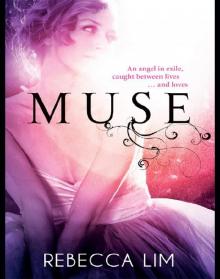 Muse
Muse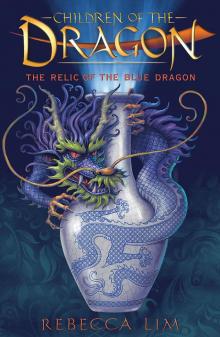 The Relic of the Blue Dragon
The Relic of the Blue Dragon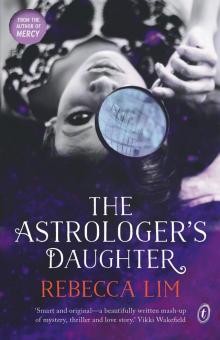 The Astrologer's Daughter
The Astrologer's Daughter Mercy (2) — EXILE
Mercy (2) — EXILE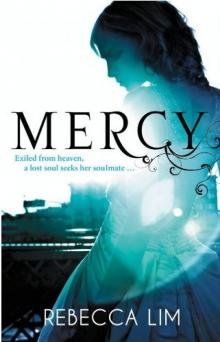 Mercy
Mercy Afterlight
Afterlight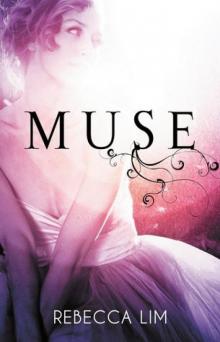 Muse m-3
Muse m-3 Mercy m-1
Mercy m-1 Exile m-2
Exile m-2